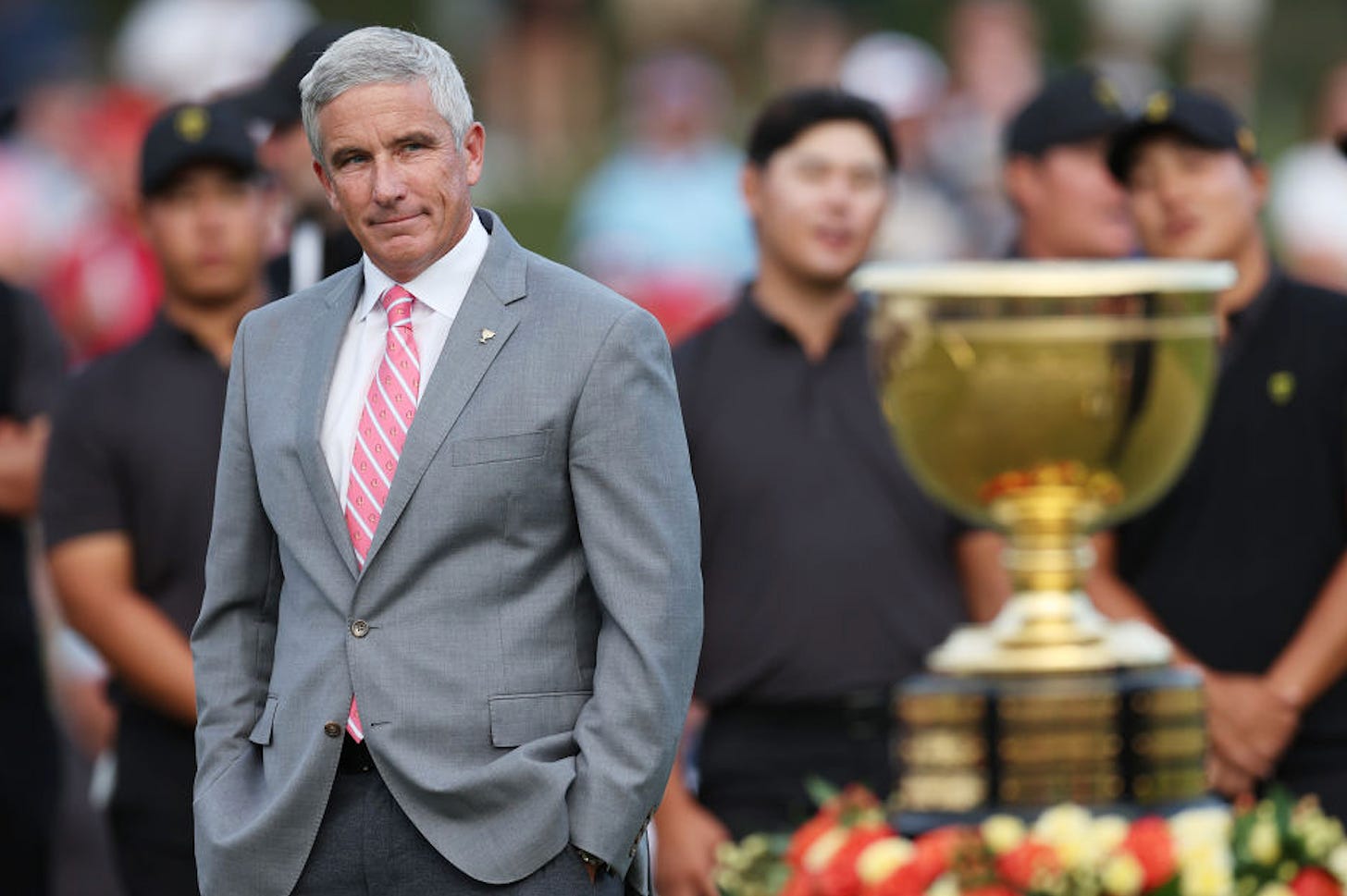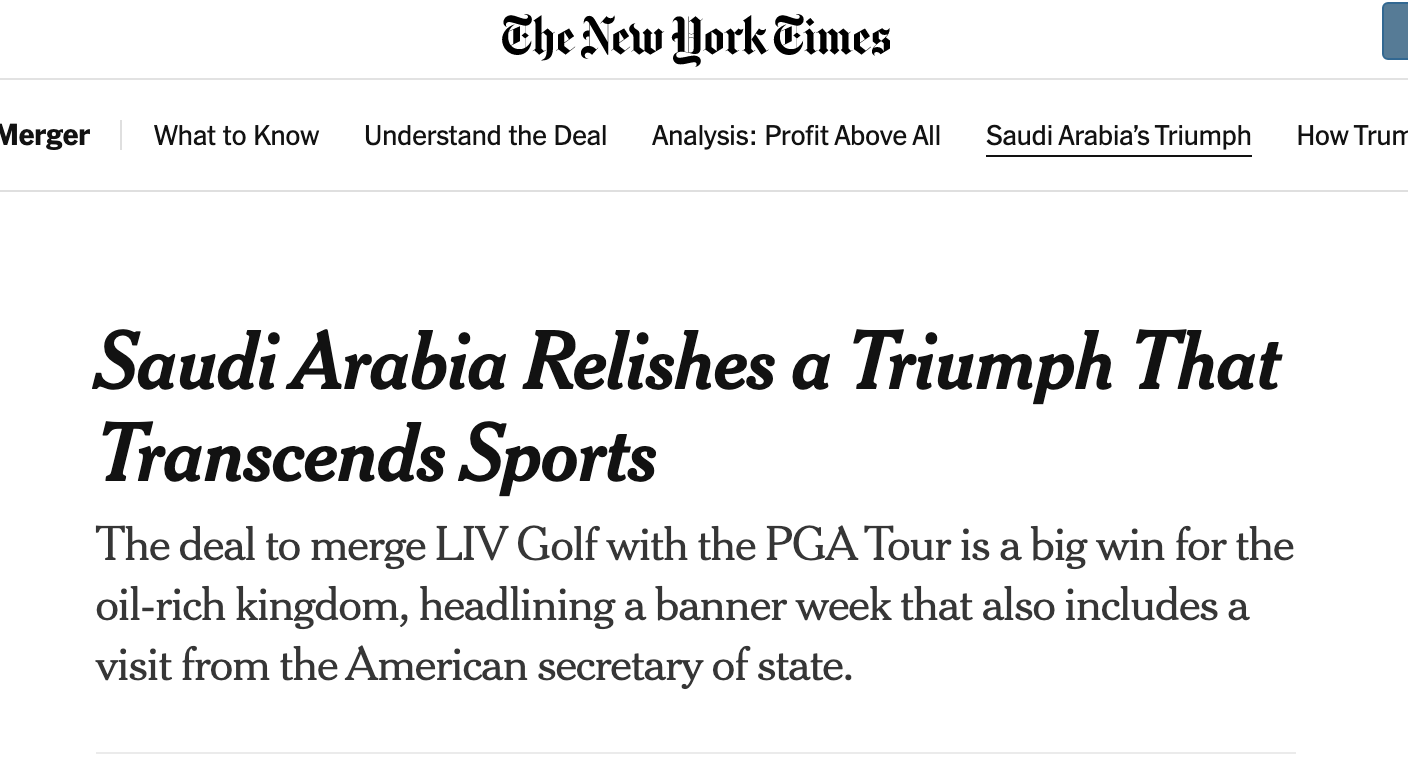The Saudi-PGA Tour Golf Deal Isn't Going to Happen
The merger or alliance between the PGA Tour and the Saudi's LIV Golf is comically illegal, and it will not happen in its current form. Something about this deal smells off.
Welcome to BIG, a newsletter on the politics of monopoly power. If you’re already signed up, great! If you’d like to sign up and receive issues over email, you can do so here.
Today I’m writing about the merger deal between the PGA Tour and LIV Golf, which is almost certainly illegal. Don’t be fooled by the press coverage, this deal in its current form isn’t going to happen.
Over the past two days, there’s been breathless reporting of a merger between the PGA Tour and LIV Golf, the new Saudi-backed golf tour that has been challenging the dominant establishment by poaching players. Here’s the gist of the deal, as far as anyone can tell.
The tour is receiving upwards of $2-3 billion, all litigation ending and LIV likely going away, according to an industry source briefed on the matter and granted anonymity because they were not authorized to speak publicly.
The background to this deal is that the PGA Tour has been the dominant monopolist over the world of golf for decades until the Saudi government through its Public Investment Fund (PIF) decided to finance a competitor in 2021, LIV Golf. LIV Golf started luring top players and putting on rival events, creating competition in the space. The two entities have been involved in a bitter antitrust suit for a year over allegations of anti-competitive behavior on the part of the PGA Tour, and the PGA Tour itself is under antitrust investigation by the government. Donald Trump is involved, with his properties hosting LIV events put on by his Saudi allies.
If you read the antitrust complaint filed against the PGA Tour last year, it seems pretty clear that the PGA Tour has been a problematic organizer of golf. “Members of the Tour receive a substantially lower percentage of the Tour’s revenues than professional athletes in other major sports,” players argued. When LIV began challenging the PGA Tour, it “threatened lifetime bans on players who play in even a single LIV Golf event” and “threatened sponsors, vendors, and agents to coerce players to abandon opportunities to play in LIV Golf events.” As Ted Tatos wrote, this is consistent with the history of competition in sports leagues, where rivalry pushes up compensation for players, and consolidation does the opposite.
To ward off its new competition, the strategy of the PGA Tour was to denigrate LIV Golf as funded by murderous thugs. Because of the Saudi government’s bad track record on human rights, a lot of players refused to play in the new league. So this merger shocked everyone who believed the PGA Tour’s human rights rhetoric. On a broader level the public discussions have been frantic about the rise of Saudi influence. I saw Tom Friedman and Andrew Ross-Sorkin on CNBC this morning wondering whether the Saudis could do the same thing to the NBA or other sports leagues, as part of a geopolitical play. And here’s a headline in the New York Times.
But I’m just baffled. There is no way this merger happens in its current form, as it’s obviously creating an illegal monopoly. There is a lot of grey area in antitrust law, but when two companies want to merge to a monopoly, and announce it as such, that’s a violation of black letter law. In fact, this deal is so wildly and comically against the law that I actually don’t think it is intended to close. If I had to guess, I would say it’s a desperate move by the Saudis to keep their dirty laundry out of an American courtroom in a separate but related case. Indeed, the more I look into it, the more baffled I become.
First, let’s talk about why this deal is illegal.
BIG is a reader-supported newsletter focused on the politics of monopoly and finance. This is journalism and advocacy that challenges power, so please consider a paid subscription. You can always get lies for free. The truth costs a few bucks, but in the long run it’s much cheaper.
For that, I’ll go to the head of the PGA Tour, Jay Monahan, who said that this merger is good for his organization because it allows them to “take the competitor off the board.” When a corporate leader publicly says the point of a merger is to monopolize a market, I can only imagine what’s in the private emails. Antitrust scholar Herb Hovenkamp, who is generally monopoly friendly, said this merger would be problematic in at least three markets: (1) live attendance, (2) TV broadcast rights and advertising, and (3) golfer compensation and terms. Given that LIV Golf and the PGA Tour have been bidding aggressively for the services of golfers, it seems pretty obvious that this deal will monopolize at least one of those markets.
It’s unusual for a corporate leader to announce he’s doing a deal to remove a competitor. As Leah Nylen reported, one reason he might be doing that is because “no antitrust lawyers were involved in the PGA Tour-LIV discussions.” This choice doesn’t make any sense. Both the PGA Tour and LIV Golf are spending huge sums of money on antitrust lawyers to fight each other, and they didn’t ask one of them to attend a meeting where they sought to merge to a monopoly? What?!?
Then there’s the announcement itself, which is pretty vague. Apparently, after saying it’s a merger, the PGA Tour is now saying that it’s not a merger. It’s an alliance, or a joint company in which they will put all assets. Or maybe it’s a ‘framework.’ Who knows? One very clear point for the PGA Tour is that whatever this deal is, it is intended to remove a competitor. And legally, if not procedurally, that’s what matters. As a result, most antitrust lawyers who have commented on this deal publicly, from the far right to far left, have scoffed at the very notion that this deal, as announced, is legal.
Former White House competition chief Tim Wu, for instance, tweeted that “While many facts missing, more I look more I doubt the proposed PGA Tour - LIV merger will survive serious antitrust scrutiny, not to mention potential CFIUS review.” Libertarian antitrust lawyer Josh Wright mocked the combination, saying, “Friends don’t let friends merge or contract, combine, or conspire with rivals without antitrust counsel.” He also pointed out that “there is a lot here that is unusual.”
And Kostya Medvedovsky, who coined the term ‘hipster antitrust,’ was in disbelief. “I am a bit confused how they could have plausibly done this without antitrust counsel, given they're currently in antitrust dispute/investigation? Feels a bit too incredible.” Senator Richard Blumenthal has already asked for the DOJ to intervene.
Katie Van Dyck, an antitrust lawyer and colleague at my organization, made a couple of relevant points, noting that “this deal is one of the most brazen mergers to monopoly in recent history.” Van Dyck also pointed out that it’s not just the Department of Justice with jurisdiction, but the U.K. and European Union enforcers. Unless Congress grants an antitrust exemption, as it did for the merger of the AFL and NFL football leagues in 1966, this deal is just crazy.
Obviously the PGA Tour and Saudi leaders understand, at some level, the legal obstacles. The people who run the PIF are sophisticated, and so is the PGA Tour. So what is really going on? I don’t quite know. One possibility is that the Saudi government, which funded LIV Golf through its sovereign wealth fund, is trying to avoid embarrassment. In February, a court ruled that they were subject to discovery in their antitrust suit with the PGA Tour, and so lots of bad emails would become public.
The Saudi Public Investment Fund (PIF) had rebuffed the PGA Tour’s discovery efforts and LIV Golf argued that the U.S. District Court for the Northern District of California lacked jurisdiction over the fund and its governor, Yasir al-Rumayyan, saying the fund is an “organ and integral part of the Kingdom of Saudi Arabia” and thus protected by the Foreign Sovereign Immunity Act.
U.S. Magistrate Judge Susan van Keulen disagreed. The FSIA ensures that any foreign state “shall be immune from the jurisdiction of courts of the United States” but with some exceptions. In a 58-page opinion, van Keulen found the “commercial activity exception” applies because “PIF’s conduct in founding, funding, overseeing, and operating a professional golf league, LIV, is commercial activity.”
By ending the antitrust fight between the PGA Tour and LIV Golf, Saudi PIF emails will remain private. It’s true that there will be a merger challenge, so bad emails could come out if they bring this merger to a trial. But a more likely path is that the DOJ investigates the PGA Tour-LIV deal, the Saudis drop their merger attempt before a trial, and LIV Golf shuts down. There could be some sort of Saudi investment in the PGA Tour later. Meanwhile, everyone gets the headlines now, which obscures the reality that the Saudis don’t want emails made public, and they can blame the Antitrust Division for the collapse of LIV Golf.
There are a lot of other possibilities. Maybe they’ll find a way to do some sort of divestment, or change the terms to make the deal palatable, though honestly I can’t see how. But when you’re dealing with Saudi Arabia, Donald Trump and global sports, you can get to things like money laundering, arms dealing, espionage, and all sorts of weird conspiratorial stuff. I don’t like speculating on that, because it’s like seeing ripples on an ocean and trying to guess what’s happening beneath. But one thing I can say is that this deal, in its current form, doesn’t make any sense.
Thanks for reading! Your tips make this newsletter what it is, so please send me tips on weird monopolies, stories I’ve missed, or other thoughts. And if you liked this issue of BIG, you can sign up here for more issues, a newsletter on how to restore fair commerce, innovation and democracy. And consider becoming a paying subscriber to support this work, or if you are a paying subscriber, giving a gift subscription to a friend, colleague, or family member.
cheers,
Matt Stoller




Perfect summary. I think the PIF wanted another opportunity to branch out the oil money and took it. There are several possible end games, and you mentioned most. One I particularly enjoy is that this is dragged out over the next two years, and Trump Admin v2 gets to issue the exemption allowing the two tours to merge officially.
I heard on a reliable pod (The Ringer) that part of the deal creates a new for profit entity that will be able to negotiate and create contracts with both players and sponsors, and that the PIF money may go into that entity. This would effectively be a $2-3 billion investment in the PGA by PIF. What the creation of LIV was intended to do all along.
Great insights and agree in theory but I'm SO cynical these days because not one banker went to jail after 2008 collapse (Democrats in charge), Trump was never held accountable, and his kids are billionaires (the list goes on). From SCOTUS to Congress we're in a corporatocracy where money decides everything. The thought that America will enforce laws and hold rich people or corporations accountable feels impossible in 2023.
Can our government discipline anyone but the less fortunate?
How are these sports leagues considered non-profit? If we can't take away non-profit status from private equity owned hospitals making billions, why should sports be penalized?
I hope you're right but however it pans out, does it matter to the 99%? Is it just another distraction from real issues like climate change?